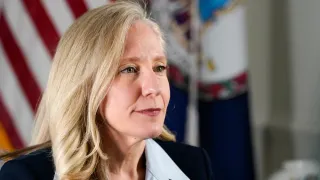February 27, 2024
Review: 'Dune: Part 2' Bewitches, Enthralls, Critiques Power
Megan Kearns READ TIME: 4 MIN.
Hypnotic and enthralling, "Dune: Part Two" mesmerizes. A stupendous and ambitious spectacle, it bewitches with dazzling visuals, riveting narrative, and a score and sound design that bombard and immerse the senses. With science-fiction an inherently political genre, the film also serves as a perceptive critique and condemnation of colonization and power dynamics.
Directed by Denis Villeneuve, written by Villeneuve and Jon Spaihts, and an adaptation of the second half of Frank Herbert's novel, the film stars Timothée Chalamet as protagonist Paul Atreides. Also starring are Zendaya, Rebecca Ferguson, and Javier Bardem, along with a stellar supporting cast, including Florence Pugh and Austin Butler.
"Dune: Part Two" picks up where the first film ends. Paul and his mother, Lady Jessica (Rebecca Ferguson), travel with Chani (Zendaya), leader Stilgar (Javier Bardem), and other Fremen to their home of Sietch Tabr. Paul and Jessica are presumed dead by the Emperor and the Harkonnens after the massacre of Duke Leto (Jessica's consort and Paul's father) and House Atreides.
Similarly to the novel, "Dune: Part Two" opens with narration by Princess Irulan (Florence Pugh), daughter of the Emperor Shaddam IV (Christopher Walken) and a Bene Gesserit. Her chronicling history of House Atreides and Arrakis serves as a reminder of the events in the first film, as well as insight into her character.
Paul becomes entrenched in Fremen culture by speaking the language and attempting to ride a giant sandworm. He fights along with Fremen warriors in a rebellion consisting of raids to disrupt the colonizing Harkonnens' spice production on the Fremen homeworld of Arakkis.
While a narrative continuation of the first "Dune" (finishing the novel's narrative, while omitting some key narrative elements), "Dune: Part Two" still feels like its own film; its story could stand alone.
Once again, Greig Fraser's gorgeous, stunning cinematography and Hans Zimmer's score reify the film's epic scope, immersing and enveloping audiences.
Paul resists fulfilling the role that Stilgar, Jessica, and other Fremen want him to fill: the mahdi or messiah. Jessica spends much of the film enmeshed in Fremen religion, plotting to make the Fremen believe Paul is their messiah (a prophecy created by the Bene Gesserit), as well as talking to her unborn-yet-conscious daughter, Alia.
Denis Villeneuve chose to focus on the Bene Gesserit – his favorite aspect of "Dune," and mine – rather than some of the other elements, like the Mentats and the Spacing Guild. Expanding the role of women characters from the novel, we continue to see the Bene Gesserit's meddling maneuvers and political machinations.
When Jessica coaxes and pushes Paul to become the Fremen's leader and act as their messiah, Paul angrily (and rightfully) retorts that the Fremens need to lead and save themselves.
In addition to Arrakis, we spend time on Giedi Prime, the homeworld of the cruel and bloodthirsty Harkonnens: Baron Harkonnen (still fatphobic in his depiction) and his nephews Rabban (Dave Bautista) and Feyd-Rautha (Austin Butler), who enjoys viciously fighting in gladiatorial games. It's hard not to compare Austin Butler's serviceable Feyd-Rautha with Sting's unforgettably unhinged and mesmerizing performance of the brutal character in David Lynch's 1984 adaptation. Lady Margot Fenring (Léa Seydoux), another Bene Gesserit member, uses her training in seduction on Feyd-Rautha for the Bene Gesserit's schemes.
Horrifying prophetic visions of people starving perpetually haunt Paul. He repeatedly tells Chani that he doesn't care about power or the prophecy, that he only wants to support the Fremen and fight with them against the colonizing Harkonnens. She respects the way he fights and his sincerity and they eventually become romantically involved. But vengeance, prophecy, and rapturous praise become harder and harder to resist.
I really appreciate the focus on Chani in this film, a character who always felt sidelined to me in the novel and other adaptations. Here, she is independent, clever, and defiant. She refuses to unwaveringly and unquestioningly follow religion and prophecies, as does her friend Shishakli (Souhelia Yakoub), a Fremen warrior. The camera often cuts to Chani so we see her reactions.
On the surface, "Dune" might seem like just another bildungsroman or a fulfillment of the "hero's journey" with Paul's tribulations and emotional coming-of-age quest. Similarly to "Lawrence of Arabia," as well as the novel "Dune," the sequel critiques colonialism, mythologizing heroes, and the myth of a white male savior.
This critique is especially interesting considering our societal fixation – both positively and negatively – on superheroes in the media. Yet, unlike superheroes in other stories, the more powers Paul gains, the more cynical "Dune: Part Two" becomes.
Watching "Dune: Part Two," especially with the Fremen being cast with mostly Black and Brown actors, reminded me of the real-life genocides happening now in Gaza, Democratic Republic of the Congo, and Sudan, as well as amongst Indigenous people here in the U.S., and the need to speak out against injustice.
A jaw-dropping spectacle, "Dune: Part Two" weaves a compelling story of rebellion, colonization, and political machinations via solid acting and masterful technical elements. It also deftly conveys the need for social justice, the danger of idolizing heroes, and the insidious seduction of power.
"Dune: Part Two" opens in theaters Friday, March 1, 2024.






